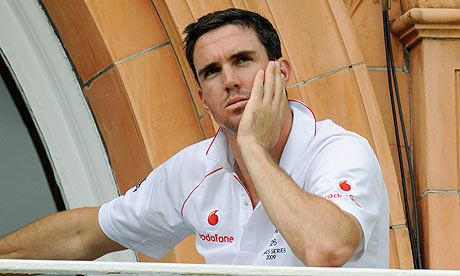
A gradual but inevitable descent into cricket-based loathing and bile.
What Would Boof Do? Eight Easy Steps Towards Fixing English Cricket
Looking at it from the outside, in particular from an Australian perspective, English cricket makes absolutely no sense. It gives every impression of managing to be anachronistic and overweening, with a healthy dose of self loathing thrown in, all at the same time. To try and decide, therefore, what Australia would do if they found themselves in England’s current, ahem, predicament, is an impossibility. Because it would mostly boil down to ‘tear down the whole thing and start all over again’. It would involve, at the very least, a complete revamp of the domestic structure, one that led to players participating in fewer, but much more competitive, fixtures each year.

English cricket: peculiar.
But that’s not really a safe avenue of discussion right now (particularly not for someone from the colonies to make), although the question over whether the current domestic structure is best serving the interests of the counties or the international setup is one that will probably come to a head at one point or another. Instead, let’s look at what would be happening differently in the English camp if one Darren “Boof” Lehmann was given the keys and told to do whatever is necessary to get the thing running again. The following might not be an exhaustive list, but we think it covers most of the major changes Lehmann would probably implement within the first few weeks of taking control.
1) Assuming that Lehmann is given carte blanche to fix the English Test team (and honestly, there is zero chance of him accepting the gig without that sort of guarantee), his first move would be to bar the likes of Paul Downton and Giles Clarke from having any say on team matters. Everything would instead be run by Lehmann directly. The above two would even be encouraged to avoid speaking to the media about team matters if at all possible. They would effectively become, using Clarke’s own lovely phrase, outside of cricket.
2) Alistair Cook would be retained as captain, but only on certain conditions being met. The most important of these being that he relinquishes any say on team selection, and accepts without reservation any changes to personnel, both playing and support, that Lehmann cares to make. In effect this is little different to what occurred when he took over management of the Australian side, where Michael Clarke’s position as captain was under heavy attack in some quarters (most of whom are now in hiding by the way). In return Cook would be backed to the hilt and encouraged to captain the team in whichever manner he chooses.
It’s hard to predict what that would look like, but then again, it’s difficult to say if Cook has ever been given unfettered control over the team before. Maybe there is genius in there, somewhere, and all it needs is a little encouragement…
3) Recall Kevin Pietersen. KP is probably the first person Lehmann would ring if given the job. But, importantly, he wouldn’t be wanting him to return in a playing capacity, rather instead as a coach/mentor. KP would be there to offer help to anyone who wants it in a role that the likes of Michael Carberry and Nick Compton have praised him for in the past. And if Cook doesn’t like it, well, he won’t be the captain anymore. Simples.

They would probably need to remove all the ‘KP is the Devil’ posters from the dressing room first though.
4) Open the dressing room door to any ex-player who has anything to offer. The Australian dressing room has had this policy from the moment Lehmann took over, and it would be the same here. The door would be open to the likes of Ian Botham, Shane Warne, Michael Vaughan, and Darren Pattinson. Well, maybe not that last one. If they have something to say that might help the team turn the corner, Lehmann would insist that the effort is made to accommodate them.
5) Sack most of the off-field analysts. Contrary to appearances, perhaps, Lehmann does make as much use of statistical data as any modern coach, but there is such a thing as having too much of a good thing. Players don’t need to be force feed information every moment of their waking lives. Instead one, or a handful, of analysts, probably answering directly to Lehmann, is all that’s really needed.
6) Pick the best eleven available. This one goes without saying, but it still seems something of a strange concept to the current English management, what with players being selected based on them having “the right families” and all. David Warner doesn’t have the right family. He might not even come from the right gene pool.
That means picking the best wicket-keeper currently available (i.e. not Matt Prior, even before he stood himself down), the best batsmen available, even if they are not quite five and a half feet tall, and the most damaging fast bowler available, even if he occasionally sprays it around a bit, and seems to hold a grudge against stumps at the non-striker’s end. Hell, they could even lower themselves to picking the best spinner available, negligible fielding ability, sweaty hands and all.
7) Encourage the players to play to their strengths and back themselves. Another one that seems self evident, but the evidence would suggest that this sort of approach has been sorely lacking in the English camp of late. Instead of trying to dictate matters from the dressing room, let the players take control over their own destiny and play in the manner that got them selected in the first place. Treating cricketers like actual human beings is actually pretty rewarding most of the time (David Warner and family excepted, of course).
8) And, finally, demand results. Again, a no brainer, but, again, something that doesn’t seem to be occurring in the current English camp. Losing a Test series at home to Sri Lanka is unacceptable. Losing to India at home is unacceptable. Losing to the Netherlands, for fuck’s sake, is unacceptable. If the results aren’t forthcoming then changes will be made, whatever the reputation of the players involved.
At the end of the day, nothing matters more than results. Although frequently in English cricket, that often doesn’t seem to be the case.


2 Comments
Post a Comment
1
Matt Larnach
25 Jul 2014 03:07
Aye, I actually don’t think there is much difference in the way the two are run, just that the despots ruling over Cricket Australia (Wally Edwards and whatnot), keep their noses out of the day to day stuff as much as possible.
I dunno how anyone in the English camp can stand all these middle manager types constantly butting in where they aren’t wanted (and are clearly out of their depth).
2
Richard Gardham
24 Jul 2014 13:27
9) Fill the team with Yorkshire players. Boof loves his Yorkshire, and many of the glut of youngsters coming through the ranks at Headingley at the moment have been helped along the way to some extent by Lehmann either coaching them at his academy of sorting them out with grade cricket teams in Australia during the English winter. Most of the time, you can see the improvement almost immediately, in both attitude and performance.
An excellent article anyway, which offers food for thought. I’m generally against English cricket solving its problems by simply following the ‘what would Australia do’ mantra, as was the case throughout the 90s, but you can’t help but feel that some straight-talking and simplifying of things from a Lehmann-like character would work wonders. There appear to be a group of people looking after their own backs at the ECB at the moment though. More’s the pity.